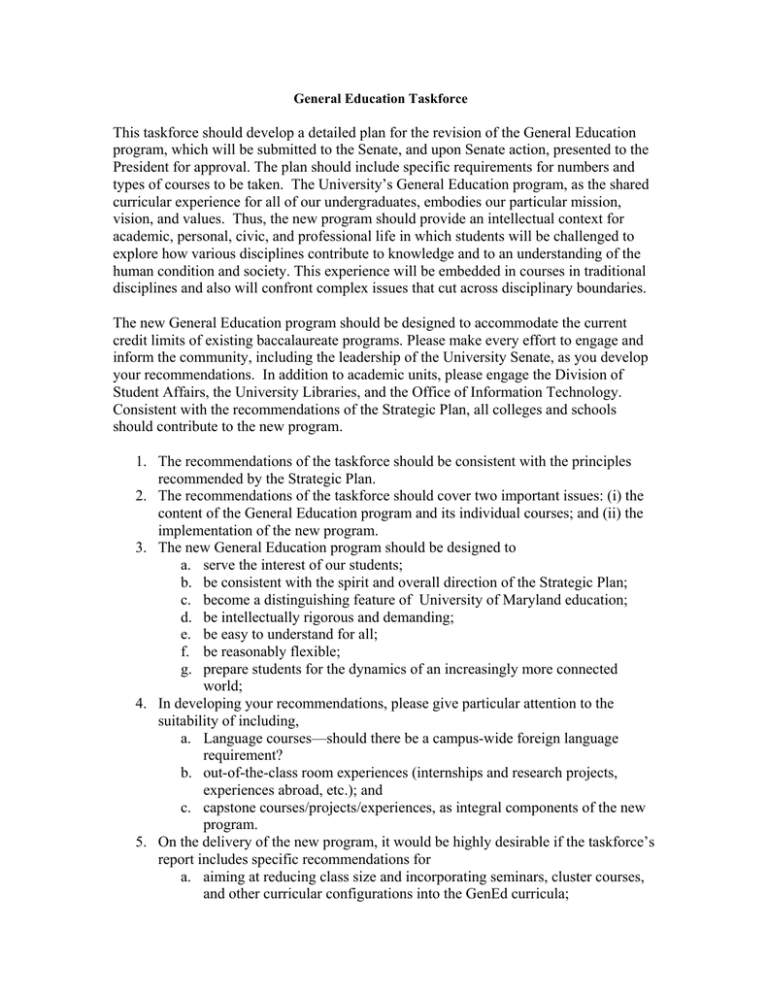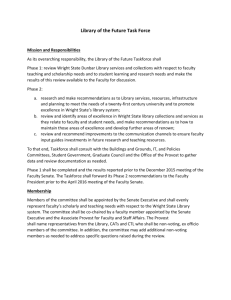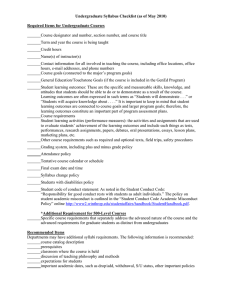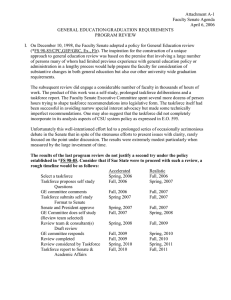This taskforce should develop a detailed plan for the revision... program, which will be submitted to the Senate, and upon...
advertisement

General Education Taskforce This taskforce should develop a detailed plan for the revision of the General Education program, which will be submitted to the Senate, and upon Senate action, presented to the President for approval. The plan should include specific requirements for numbers and types of courses to be taken. The University’s General Education program, as the shared curricular experience for all of our undergraduates, embodies our particular mission, vision, and values. Thus, the new program should provide an intellectual context for academic, personal, civic, and professional life in which students will be challenged to explore how various disciplines contribute to knowledge and to an understanding of the human condition and society. This experience will be embedded in courses in traditional disciplines and also will confront complex issues that cut across disciplinary boundaries. The new General Education program should be designed to accommodate the current credit limits of existing baccalaureate programs. Please make every effort to engage and inform the community, including the leadership of the University Senate, as you develop your recommendations. In addition to academic units, please engage the Division of Student Affairs, the University Libraries, and the Office of Information Technology. Consistent with the recommendations of the Strategic Plan, all colleges and schools should contribute to the new program. 1. The recommendations of the taskforce should be consistent with the principles recommended by the Strategic Plan. 2. The recommendations of the taskforce should cover two important issues: (i) the content of the General Education program and its individual courses; and (ii) the implementation of the new program. 3. The new General Education program should be designed to a. serve the interest of our students; b. be consistent with the spirit and overall direction of the Strategic Plan; c. become a distinguishing feature of University of Maryland education; d. be intellectually rigorous and demanding; e. be easy to understand for all; f. be reasonably flexible; g. prepare students for the dynamics of an increasingly more connected world; 4. In developing your recommendations, please give particular attention to the suitability of including, a. Language courses—should there be a campus-wide foreign language requirement? b. out-of-the-class room experiences (internships and research projects, experiences abroad, etc.); and c. capstone courses/projects/experiences, as integral components of the new program. 5. On the delivery of the new program, it would be highly desirable if the taskforce’s report includes specific recommendations for a. aiming at reducing class size and incorporating seminars, cluster courses, and other curricular configurations into the GenEd curricula; b. additional emphasis on the quality of instruction, including the experience, track record, and stature of instructors; c. emphasis on the use of innovative and improved teaching methods, including information technology tools; and d. additional emphasis on writing, which should be an integral component of most GenEd courses. 6. In designing the new GenEd Program, it is important that we pay special attention to a. articulation of the learning outcome goals for each element of the program consistent with existing University policy; b. an analysis of the numbers and types of courses that would have to be developed in order for the proposed program to meet the needs of the entire undergraduate student body; c. an analysis of the fit of GenEd requirements with existing major requirements; d. an analysis of GenEd courses typically covered through transfer and Advanced Placement or similar credits, to be used to determine how transfer credits may be accommodated within the new structure; e. an analysis of potential software and training issues that the new program poses for advisement and registration. Finally, there remain open issues and questions relative to our Fundamental Studies requirements. The taskforce should feel free to consider these issues as a part of its deliberations and recommendations. The Task Force should begin its work immediately. We expect the Task Force to submit its report with a proposed plan for General Education before the end of the fall semester 2009 with deliberations at the Senate immediately thereafter. We would like to thank each and every member of this Task Force for your expertise, your enthusiasm, your dedication, and for your time. As a group, you represent units, disciplines, and inter-disciplines from across the campus. We are all especially indebted to your chair, Ira Berlin, whose matchless leadership and tireless devotion to undergraduate education constantly reminds us of the essential linkages between academic excellence and our research mission. You all are about to embark on a wonderful and challenging journey to refine the heart of our undergraduate experience for the next generation of University of Maryland students. Your chair will update us on a regular basis as the work develops. We enthusiastically look forward to hearing of your progress and to receiving the final plan.


